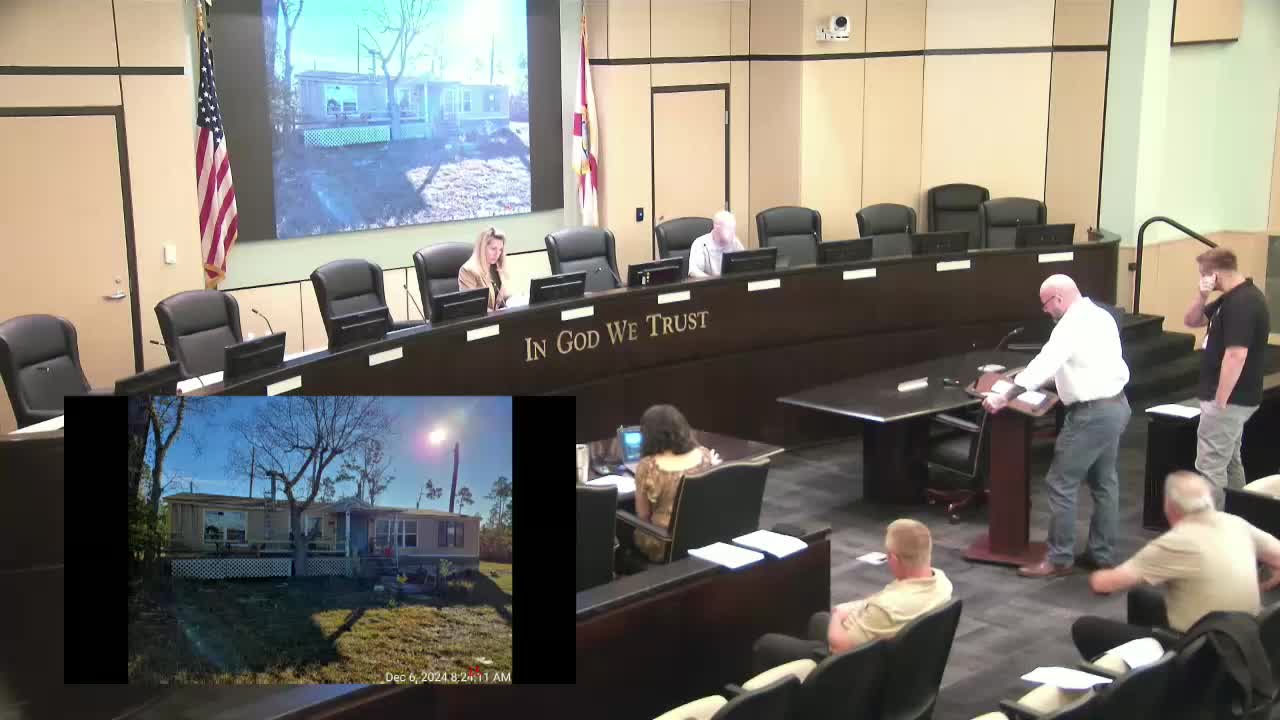Magistrate gives owner five days to produce engineer report after inspectors find unpermitted, potentially unsafe repairs at Brown Road mobile home
Get AI-powered insights, summaries, and transcripts
Subscribe
Summary
Bay County special magistrate ordered owner Asan Rosavi to deliver a written engineer or architect evaluation to code enforcement and the building department within five days after inspectors described broken trusses, roof deflection and missed inspections on a heavily damaged mobile home at 7116 Brown Road.
Tiffany Surdy, Bay County special magistrate, ordered owner Asan Rosavi on Oct. 9 to deliver a written evaluation from a licensed engineer or architect to both code enforcement and Bay County Building Services within five days so the departments can decide whether to permit or require additional repairs.
The order followed testimony from Bay County building inspector Justin Wright and code enforcement staff that the single-family mobile home at 7116 Brown Road shows extensive hurricane and water damage, broken and scabbed roof trusses, altered window and door openings and multiple missed inspections. Wright testified the structure had “broken trusses” and that contractors had “scabbed on” lumber in several places rather than using a prescriptive, engineered repair. Building inspector Scott Thorpe described rot at the bottom plate and rim joist and said the permit record contained discrepancies that complicated review.
Why it matters: the magistrate found the property previously had been declared unfit and a repair permit issued and later revoked; county inspectors said the work that has been done exceeds the scope of the recorded permit and may compromise the structure. Owner Asan Rosavi and attorney Mitch Dever said engineers engaged by the owner have reached different conclusions and that permitting paperwork and additional engineering will be submitted. Rosavi told the magistrate, “I have easily spent over $10,000 between the engineers and my lawyer fees.” Dever said, “We’ll get an architect or an engineer out there to say what needs to be done.”
Inspectors described several specific concerns: windows resized without approved drawings, missing nailing and dry‑in inspections, new wiring not in the permit scope, and roof deflection that inspectors link to damaged trusses. Wright told the magistrate, “They’ve done nailings, and nobody’s inspected the nailings.” Building official Paul Bouchain (on the telephone) explained that the permitting system will flag an active enforcement case and the building department will check with code enforcement before extending or reissuing a permit; he said, “If there was no reason to call code enforcement, we would extend the permit.”
Magistrate Surdy said the county’s file did not contain a complete engineering package sufficient to clear the work and ordered a concrete next step: within five days, deliver the architect/engineer report and any revised plans to code enforcement and the building department so staff can decide whether to accept them and whether to reissue a permit. If the building department deems the submittal inadequate, code enforcement may proceed under the prior magistrate order. Surdy set a compliance process rather than immediately imposing abatement or demolition, and she reminded participants that a separate compliance hearing is scheduled for Nov. 20.
The record: the case record shows a prior magistrate hearing in February where the structure was found in violation; inspectors testified that a repair permit was issued and later administratively revoked because work had been done outside the approved scope. The magistrate said she will not force the building department to issue a permit and that the department must independently decide whether the owner’s engineer’s documentation satisfies structural requirements. The hearing concluded with the magistrate repeating the five‑day deadline and asking that the owner provide the documents to both departments so the county can determine next steps.
